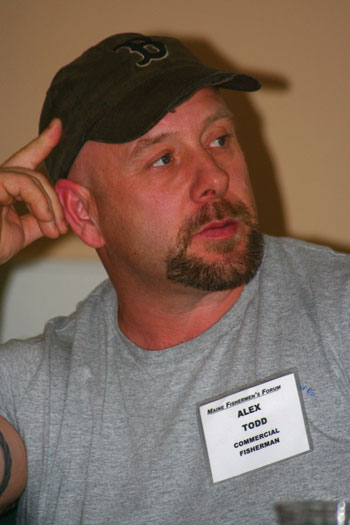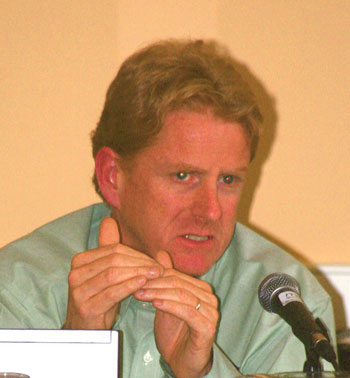Can Fisheries Licensing Become More Flexible?
by Laurie Schreiber

Alex Todd, commercial fisherman, Chebeague. “It’s a hard balance. You can’t let latent effort in, you can’t continue to take away from people struggling to make a living, but you have to have something there to allow the community to continue to be a fishing community.” Laurie Schreiber Photo
ROCKPORT – Fishermen considered how to balance fishery access with stewardship, during a seminar called “Licensing for the Future of Maine’s Fishing Communities” at last month’s Maine Fishermen’s Forum.
Overall, the discussion revolved around the concepts of flexibility, the ability to move between fisheries and enter new fisheries, and provide access for new entrants, all while protecting fishery resources for future generations.
The discussion arose at a time when the lobster fishery predominates but is also challenged by the low boat prices seen last year and changing climate conditions that could affect the health of the resource.
Fishermen were asked, “Would you like to have another fishery besides lobstering? In harbors where lobstering is not very profitable, many fishermen want to diversify into other fisheries, some of which are now closed, such as urchins and scallops. Could we return to the idea of being fishermen rather than being defined by a few single-species licenses? Could we make Maine licensing flexible, especially as resources change with a changing ocean? Could we build something like the lobster apprentice system or town clam stewardship requirements into entry to other fisheries? What is needed to make sure we keep owner-operator? How do we support our kids to be able to become fishermen?”
Alex Todd, a commercial fisherman from Chebeague, called for government regulators to give the same consideration to fishing communities that they do to fishing resources.
“I’ve lost quota, days at sea, traps, everything,” Todd said. “It’s getting harder and harder to make a living. At the same time, I’m seeing less kids in our area with accessibility to it.”
Todd said he didn’t want fishing in his community to end with his generation.
“I hope to get sustainability for the community,” Todd said. “It’s a hard balance. You can’t let latent effort in, you can’t continue to take away from people struggling to make a living, but you have to have something there to allow the community to continue to be a fishing community.”
Dan McKiernan, deputy director of the Massachusetts Division of Marine Fisheries, discussed transferability options available to that state’s fishermen, who must meet certain criteria such as an owner/operator rule. That rule, he said, is essential for preventing big corporate buy-ups of licenses.
“Moving forward,” said McKiernan, “if we could go to a model where fishermen had a multiple-permit portfolio but had to be the ones fishing, that would be a great outcome.”
McKiernan pointed out that the two ideas – keeping the door open for future fishermen, and giving fishermen the opportunity to diversify – might be competing problems. “You can’t do them both,” he said.
Massachusetts is currently seeing increasing numbers of limited-entry endorsements bought out by fishermen seeking to diversify their fishing opportunities, he said. Much of Massachusetts doesn’t have a year-round lobster fishery, so that model will probably work for his state, he said.
“That’s a fork in the road that Maine may have to decide,” McKiernan continued. “What is it you want to accomplish? Do you want to give the existing population of fishermen the ability to jump between fisheries, or do you want to continue to allow more people to come in?”
Robin Alden, executive director of the Stonington-based Penobscot East Resource Center and a former commissioner of the Department of Marine Resources, said that fishermen’s meetings held by her organization had last year indicated that there was a lot of interest in allowing existing fishermen to diversify.
“The other comment we heard was, we’re going to be much more interested in the health of those other resources if we think that we have the chance to fish it in the future,” Alden said. “ ‘If there’s no way in, who cares?’ And that’s sort of the bottom line.”
Over the years, Alden said, fishermen have supported the idea that participation in a fishery should be tied to stewardship.
“When the apprenticeship rule went into place, there was a lot of concern in the lobster fishery that lobstering was getting easier to do. The lobster population was on its way up and there were a lot of people getting in who didn’t know how to fish, how to tie their gear, how to fish beside other people,” Alden said. “There was a feeling that, the fact that it was easier to get into because of the resource and technology changes, there had to be some way to ensure that somebody knows the basic rules. It also was a proxy for slowing entry. This was before the zones put fixed ratios in. The idea was that, instead of buying or selling a license, the person who wanted to get in would put two years of their life into it, and they would decide during the course of that if it was something they would want to do.
There are a lot of people who are frustrated by aspects of the apprenticeship program specifics, but tremendous support for the apprenticeship program. And I think that concept has room for expansion in the future.”
One man said the discussion raises the question of whether the fisheries are truly a “public” resource, or whether it was merely a resource that supports a specific section of the public.

Dan McKiernan – deputy director MA Division Marine Fisheries. “What is it you want to accomplish? Do you want to give the existing population of fishermen the ability to jump between fisheries, or do you want to continue to allow more people to come in?” Laurie Schreiber Photo
Alden responded that governments have a right to regulate public resources. “It’s a matter of values, of, How does the state decide who has the rights?” Alden said. “That’s the type of conversation we’re having right now. Is it something where a community that’s nearby has more rights or not? Do you reward stewardship in order to give people access, or do you have it be wide-open, so different people have access to it? We have a lot of flexibility here. But there is need for restraint, so the state steps in and, ultimately, the legislature sets the values that determine how these decisions are made.”
Todd said he supported the idea of family and community history as helping to inform fishery participation. “I want the communities to continue, and I see transferability as a hindrance to that,” Todd said. “Young persons are stopped by having to come up with hundreds of thousands of dollars to buy into a fishery.”
Marshall Alexander, a commercial fisherman for more than 50 years, said that most older fishermen have participated in every fishery the state has. “It’s what we had to do, because they were all boom and bust. They will always be boom and bust, depending on the conditions,” Alexander said.
Today, said Alexander, the mentality of younger fishermen seems more cut-throat. “Everything is so easy nowadays,” he said. “Consequently, they don’t seem to help each other the way they should, or they don’t ask the old-timers for advice. I told [my crewmembers] the other day, ‘You’ve missed the best part of fishing. Because it isn’t there any more.’ ”
Another man said that changes in technology have to be taken into consideration. “The unit of effort 20 years ago – boat, captain and crew – compared to nowadays, has changed a lot,” he said. “We put a lot more pressure with one vessel and two people than we used to. We can pinpoint a fishery in a day and completely clean up….So you’ve got to be careful how many licenses you put in, because it takes us just a few years to devastate something – not on purpose, but just because we’re trying to earn a living and we’re getting little better and a little more competitive. We’ve got to be more careful. Even 20 years ago, scallop draggers had gas motors, 100 and so odd horsepower. Draggers today probably have 300 to 600 or 700 horsepower, a lot bigger boats, a lot bigger gear, put a lot more pressure on the fishery real fast. So we’ve got to be careful.”
Speakers discussed better ways to tie certifications or qualification systems to license access, as well as to revoke licenses for fishing violations. Colonel Joe Fessenden, chief of the Maine Marine Patrol, said the elver fishery has proved a successful experiment with regard to the latter.
“It’s a couple of strikes and you’re out of business,” Fessenden said. Although the elver season saw numerous violations last year, most concerned people who were harvesting without a license.
“As far as license holders, we had very few documented violations,” he said. “I think it had a lot to do with, You get caught and you lose your lifetime license….I think their license meant a hell of a lot more to them.”
The lobster fishery is a striking contrast, he said.
“We keep detailed records of people’s violations and warnings and summonses, they go back to at least 1990, and we’ve got people that have rap sheets that are 10 or 15 or 20 violations, significant violations,” Fessenden said. “So you’ve got to look at that as, How much stewardship do those people have?”
He added, “But the majority of fishermen are honest, hard-working people.”
Kent Bradstreet, a Zone D lobster license-holder, said his family’s situation is an example of the need for changes in the licensing process. Bradstreet said he has held his license since age 10.
“Since the age of 18, I stopped fishing,” he said. “And that’s important, because my old man wants to start fishing again. He drives three hours a day to go to Zone C, so he can get an apprenticeship and hold a license in Zone C. That’s a tad unreasonable. I hold a Class 3 license with 800 tags, that I spend $1,000 on each year, and I don’t even own a boat. Something’s wrong with our licensing system. I’d like to pass my license onto my father. I just want someone to use what I can’t.”
A fisherman from Lubec spoke to the importance of finding a way to provide access for future generations, for families with long fishing histories. “When I was a kid growing up,” she said, “my grandfather was a herring fisherman. I remember getting the call in the middle of the night, There’s herring in the bay. My grandmother being so excited, because they were poor. I’m a fourth-generation sardine-packer. We’ve lost all our sardines.”
She said that, over the years, she worked in various fisheries, including scallop, shrimp and groundfish. Poor regulation resulted in a lot of waste, she said. Today, as an elver fisherman, she said she’s worried about the potential for devastating that resource. And she said she’s concerned that her son, despite his fishing heritage, is unable to fish, other than picking periwinkles and digging for clams.
“He grew up and watched it all go,” she said. “Being from a fishing family, that’s our identity. It’s all we know how to do.”
